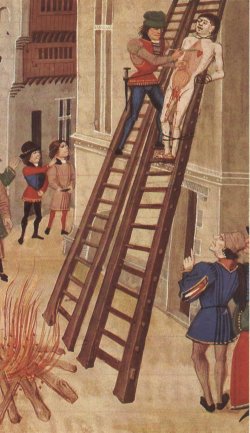
Hugh Despenser, 1st Lord Despenser
Born: Unknown
Died: November 24, 1326
Hereford, Herefordshire, England
Despenser Junior in History
Thanks to the influence his father, Hugh Despenser the elder, experienced at the English court, Hugh Despenser the younger was able to attain a highly advantageous marriage (1306) to Eleanor de Clare, a sister and co-heiress to the wealthy Earl of Gloucester. Gloucester's death at Bannockburn (1314) split the de Clare inheritance between Eleanor and her two sisters, and Despenser made sure that he and his wife received the most substantial portion (he was not unjustified considering his wife was the eldest of the sisters). By 1317, Despenser had not only received his fair share of the inheritance but also moved in on the portions of his wife's sisters, gaining him few friends in the process and showing his trademark characteristics of greed and aggressiveness. Despenser was now a very wealthy man, and he and his father were arguably the most powerful men at Edward II's court. In 1318, Despenser the younger was made chamberlain of the royal household and would only allow those whom he approved of to see the king, denying many of the magnates and even Queen Isabella access to him on many occasions.
As the power of the Despensers rose, so did the hatred the nobility showed towards them. The younger Despenser's aggressive behavior in expanding his territories in the Welsh marches angered many of the marcher lords, who proceeded to attack and devastate his lands by 1321. At this point, Edward II was forced to exile both Despensers. Later that same year though, they had already returned to court, prompting the Earl of Lancaster and several other powerful magnates to openly rebel. The king achieved the one major victory of his reign by defeating Lancaster at Boroughbridge and subsequently executing the earl. With Lancaster dead, the Despensers practically ran England until their downfall in 1326. The elder Despenser was created Earl of Winchester and the younger had become one of the wealthiest men in the nation and may as well have been the king's shadow. However, with constant military defeats in Scotland and the loss of parts of Gascony in France, the Despensers, as the men in charge, became increasingly unpopular. The fact that the younger Despenser especially was a greedy, violent waste of life did not help the situation. To soothe the situation in France, Edward II sent his wife Isabella to negotiate a treaty with her brother, the French King Charles IV; the king's son, Prince Edward, was sent over soon after in order to pay homage to his uncle for Gascony. However, Isabella joined forces with a number of English exiles, including Roger Mortimer, her new lover, and vowed not to return to England until the Despensers had been removed from power.
The king, of course, refused to comply, prompting the queen and Mortimer to invade England with the intention of putting the young Prince Edward on the throne so that they may rule in his name. It came as no surprise that the Despensers were the primary targets of the rebels, and they were virtually unopposed in their actions. The elder Despenser was captured and executed in October 1326, and the younger was captured, along with the king, in the following month. Ultimately, Despenser was convicted of treason and was hanged, disemboweled, beheaded and quartered on a custom-built, fifty-foot platform on the streets of Hereford. There can be no doubt that Despenser deserved his gruesome death, and the people rejoiced at it at the time. He had abused the power he had been awarded and paid the ultimate price.
Despenser Junior in Marlowe
Appears in: Edward II
Spencer Junior first appears in Edward II as a former follower of the late Earl of Gloucester. He then says he will work his way into royal favor by following the king's favorite Piers Gaveston. This plan proves effective, and after Gaveston's death, the younger Spencer becomes the king's new favorite. In the end, he and the king are captured, disguised as monks, at a local abbey. Both Spencer and his father are executed by the rebels. Within the play, Marlowe has the king, falsely, create Spencer Junior Earl of Gloucester. While the historical Despenser was indeed married to one of the co-heiresses of the Earl of Gloucester, and ultimately held nearly all of the lands that were associated with the earldom, he never held the title itself.
References
Hamilton, J. S. ‘Despenser, Hugh, the younger, first Lord Despenser (d. 1326)’, Oxford Dictionary of National Biography, Oxford University Press, Sept 2004; online edn, Jan 2008 [http://www.oxforddnb.com/view/article/7554, accessed 5 June 2010]